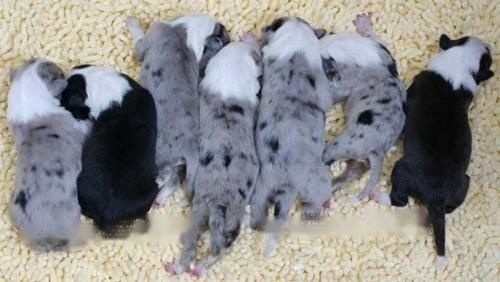During the growth and development stage, all parts of the puppy's body do not grow evenly. From birth to 3 months, the main body gains weight, so the feeding of dogs is very critical during this period of time. , and the dog is also very healthy during this time period, mainly for a series of training for the dog.

Food: The feeding time should generally be arranged during the day, which is suitable for the general activity of the animals. If you have three meals a day, you can have breakfast at around 8:00, lunch at around 1:00, and dinner at around 6:00. The composition and quantity of food are basically the same as 2 months old. Since the dog is growing day by day, the amount should be increased appropriately. Generally, every 3 to 5 days, the original amount can be increased by about 1/5.
Generally, the individual size and leg bone thickness of the puppy are all related to heredity, but the amount of food they eat has little to do with their nutritional status. In the growth and development stage, each part does not grow evenly. For example, from birth to 3 months, the body and body weight are mainly grown, the body length is mainly increased at 4-5 months, and the body height is mainly increased after 7 months. Therefore, during the growth and development period, special attention should be paid to not only balanced nutrition, but also sufficient nutrients. If the puppy eats too much, it is easy to hurt the stomach and affect the gastrointestinal function. If you eat too little, the nutrients necessary for the growth and development of the body cannot be guaranteed, the body will be thin, and the resistance will be poor. Dogs in the growth and development period are generally nutritionally balanced and nutritious food (solid or semi-liquid food). The amount of feeding per kilogram of body weight per day is about 60-70 grams, and it is divided into 3-4 times.
Excretion: Eat 3 times a day, and defecate about 3 times a day. Dog pups sometimes urinate out of joy or fear. This is a manifestation of emotional richness or nervousness. It is generally difficult to control, but it can disappear naturally by adulthood.
Education: Basic education of pups and education on good eating habits. When the puppy is eating, do not let her play while eating. If she suddenly stops to play while eating, you can take her food away and let her eat it until the next feeding. If she eats well, you can praise her. Be gentle with dogs and don't be overly scolding.
Health: monthly health check, urine test. Regular deworming
Prophylactic injection: After 2-month-old vaccination, because the immune mechanism of the body is not fully developed, the immunity generated is insufficient, and repeated injections are required to enhance the body's immunity. Rabies vaccination must be administered when the pups are 3 months old. This is the stipulation of the dog raising law, and it is also her right to the dog, and an obligation to the dog to the owner.
Special attention: 3-month-old dogs are prone to picking and eating things from the ground, and sometimes unexpected things enter her stomach, such as buttons, pebbles, needles, nails, and plastic. These foreign bodies can easily damage the gastrointestinal mucosa or cause intestinal obstruction. When it is found that the puppy has severe vomiting and abdominal pain, X-ray examination should be considered. If it is determined to be obstructed, surgery and other measures should be taken in time, otherwise it may be life-threatening.
![[Dog Training 5] The training method of pet dog dining etiquette](/static/img/12192/12192_1.jpg)




